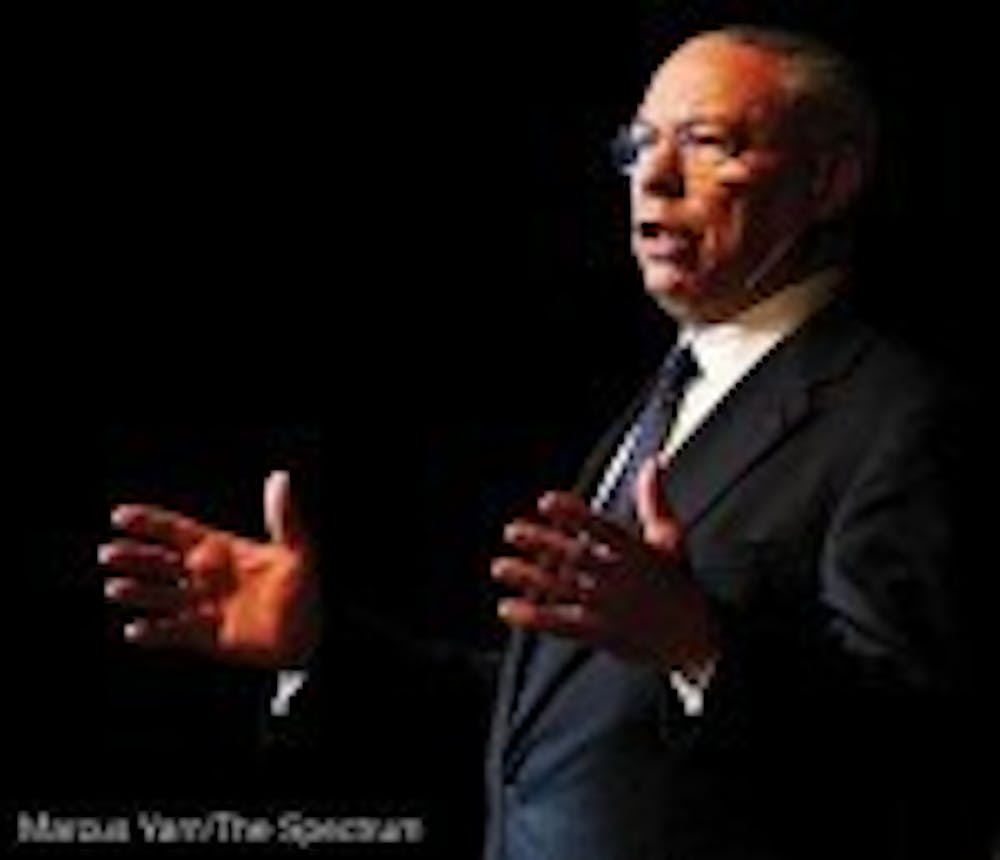Former U.S. Secretary of State Colin Powell steered clear of his involvement in the Iraq war and urged Americans to remain open and diverse in the face of terrorism Wednesday night as the second speaker in UB's 2005 Distinguished Speaker Series.
Drawing from a 35-year career in the U.S. Army and almost 20 years of government service, Powell stressed the value of leadership and gave examples of the great leaders while subtly advertising his own accomplishments as a leader. He also said that America must stay the course in the war on terror.
The sold-out audience gave the former general a standing ovation when he appeared and repeatedly interrupted his speech with thunderous applause and laughter.
Powell began his speech with a series of humorous anecdotes about his life in retirement since he stepped down from the secretary of state post last January.
"Frankly, at this stage of my life, I'm just happy to be anywhere," he said.
Powell cast off all pretensions of an austere high-level diplomat and attempted to show his human side as he stepped in front of the podium and joked about the special treatment he received as the former secretary.
"It was cool," he said as he smiled.
After Powell warmed the audience up with his humor, the speech turned serious as he went on to discuss the conditions in other countries.
Powell touted his role in helping transform Iraq and Afghanistan into democracies, but avoided his involvement in the decision to go to war in Iraq.
He also voiced his disagreement with certain aspects of the Bush administration's policy toward the two nations.
"I'm not sure we did it right at the end of the war in Iraq. But we can't walk away until we have accomplished the mission," he said. "Democracy is a hard system to master. These countries need our help. So, we must stay the course."
Throughout the speech, Powell weaved his own accomplishments into his central message of the importance of leadership.
"On 9/11, we were hit pretty hard. And we've done a better job at tightening up security at our airports, our borders with Canada and Mexico, as well as our databases. We are also more selective about who can come into our country," he said.
According to Powell, the more stringent border policy discouraged foreign students from coming to the United States and damaged America's relations with other nations. Powell said he believes that, as secretary of state, he helped to reverse this negative trend and retain foreign talent.
"I persuaded the president to make our country more open to foreigners. At the State Department, I helped to set up exchange programs and offer Fulbright scholarships to foreign students," he said.
Powell argued that America's true strength lies in its generosity and diversity.
"We are a generous, kind, open society. And the best way to make sure the terrorists don't win is to not become closed and insular. We must set an example for the world," he said.
To illustrate what good leadership entails, Powell talked about memorable events in his life, including being witness to the collapse of the Soviet Union when he was the national security advisor in the Reagan administration.
"We did pretty well in Europe. We ended the enmity between us and the Russians. As a result, a world war was averted. There will not be a regional war, a world war in our lifetimes, because of the fall of the Iron Curtain," he said, referring to the divide between the Communist Eastern Bloc and the rest of Europe.
Powell also cited Japanese Prime Minister Junichiro Koizumi, Chinese leader Deng Xiaoping, and former Russian President Mikhail Gorbachev as examples of great leaders.
"These men stared reality in the face and refused to turn away. They did what was necessary to turn their countries around," Powell said. "Deng Xiaoping had a famous saying: 'It does not matter if the cat is white or black. If it can catch a mouse, it is a good cat.' This stood for the idea that a leader must use whatever system that works, whether you call it capitalism, communism, socialism, or anything else."
Some who attended Powell's lecture said they were hoping for more substance.
"He's funny," said Manu Prativadi, a sophomore biomedical science major. "I liked his jokes about his retirement and getting a corvette. It would have been nice to hear about why he stepped down as secretary of state, however."
Freshmen Christian Beachy and Matthew Jackson didn't even find the speech humorous.
"It's not funny. I just thought he was witty," said Beachy, a freshman aerospace engineering major.
"I think his main message was that Americans are generous, not snotty," said Jackson, a freshman media studies major. "I agree that the American people are generous, but I don't know about the government. We should not take over little countries over selfish needs,"
Others said they felt inspired by Powell's speech.
"I got the sense that no matter what problems we have, we can overcome them," Kristen Bayerl, a freshman pharmacy major. "That's the kind of optimism that was started by our forefathers."
Senior Shyman Kumar and junior Rhubini Asokumar, like much of the audience, had mixed reactions.
"I liked how he talked about the need to forge relations with other countries. I liked what he said about the Palestinian-Israeli conflict," said Kumar, a biotechnology major, referring to Powell's one wish for peace in Israel. "But I think he's a part of the policies of George Bush, and I don't agree with those policies."
"I think he's a good speaker," Rhubini said. "His humor definitely brought out the human side in him. He's has a big role in the wars we're fighting right now. His defense of his position had sense, but is not convincing."





